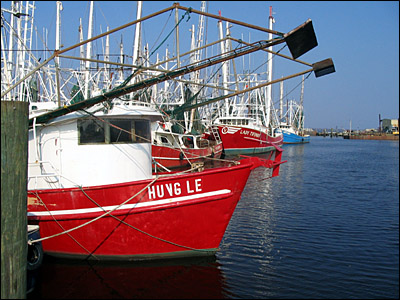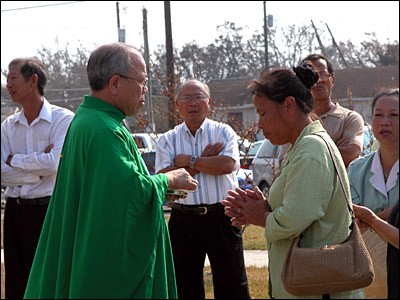 |
 | ||
|
The Vietnamese in East Biloxi part 1, 2 "They've been crushed," says Michael Hampton, director of a nonprofit group in Biloxi helping local Vietnamese recover. "I know of one elderly gentleman," Hampton says, "I found him three days after the storm sitting in the street. Before the storm, he could speak pretty good English. After the storm, it just hit him so hard, he reverted completely to Vietnamese."
Before Katrina hit, East Biloxi was home to one of the largest Vietnamese communities on the Mississippi Gulf Coast. The population was roughly 2,500. They were drawn to Biloxi by jobs in a familiar industry: fishing. In the weeks just following Katrina, colorful shrimp boats idled at one of East Biloxi's few remaining docks. Vietnamese fisherman Ty Vinh says these vessels survived the hurricane by sheltering up in nearby rivers. The owners lashed boats together to combine engine power. "When they move one boat, they move whole boat," Vinh explains. "It's like a train. They move the whole thing. When the storm blows us out, everybody got the engine on, so we go forward. Everybody go forward at once." Ty Vinh's boat survived the storm, but the Gulf shrimp industry is still struggling. It was foundering before Katrina came along because of cheap shrimp from overseas and high fuel prices. Then the hurricane damaged or destroyed more than half the region's commercial fishing boats, according to Mississippi fisheries expert Corky Perret. "One of the scary things for the historical fishing communities," Perret says, "is that many of these people who have not been able to get back on the water are taking jobs in construction and off the water." Perret fears that many will choose to stay off the water for good. It's too soon to say how many of Biloxi's ethnic Vietnamese will give up shrimping. Meanwhile, other Vietnamese-owned businesses in East Biloxi were also wiped out by the storm. These days, local entrepreneur An Lee earns a living selling phone cards and running a travel agency. But her East Biloxi video store and her 20 rental properties are an almost total loss. Always on the lookout for new opportunities, she and her husband have looked into buying a neighbor's property to start a restaurant. But rapidly expanding casinos may beat them to it. "We're so close to the casino, our neighbors are thinking maybe the casino is going to buy it for triple what we've offered them," says Lee. "So we've said we'll wait. And, hey, if the casino buys us out then we'll go elsewhere with our dreams." An Lee has already moved her travel business to a town just up the road. She's following the path of many Vietnamese who are beating a retreat from East Biloxi. The place they've landed: D'Iberville, also known as North Biloxi. Community advocates for the Vietnamese are concerned. Before Katrina, East Biloxi's Vietnamese were firmly connected to a neighborhood anchored by a large Vietnamese Catholic church, a Buddhist Temple, and a mix of small businesses and restaurants.
Hurricane Katrina destroyed the businesses and scattered residents to neighboring towns. Owners of several of those businesses, including a thriving bakery, an Asian food store and a gas station have already rebuilt. But most residents have not. East Biloxi is a patchwork of empty lots and FEMA trailers. Some Vietnamese people have resettled in places like D'Iberville, away from the threat of another storm surge. Others are still in limbo. "For most people it's a wait and see situation; they're not sure what to do," says Nguyen Dinh Thang, the executive director of Boat People SOS, which offers services and aid to local Vietnamese residents trying to recover from Katrina. People are waiting to find out whether they'll get a federal grant to rebuild, whether they're sitting on valuable casino property, and whether their neighbors will stick around. "We need to show them that there are people from outside, and from here, determined to rebuild this community," says Thang. "That might tip the balance; some that are undecided might come back. Some that are totally dispirited might think, 'Wow, there's something good out there.'" Gordon Brigham is leading a national non-profit development group, Living Cities, that specializes in reviving blighted urban neighborhoods. Biloxi's mayor hired Living Cities to develop a recovery plan for East Biloxi. Brigham would like to see as many East Biloxi residents stay as possible. But, he says, they must be willing to envision totally different forms of housing, a whole new community, built to withstand hurricanes. "You do deserve to live in this neighborhood if you want to," says Brigham. But Katrina has changed the landscape for good, he says. "It's an opportunity, but only if people living in single-family houses understand they probably can't go back and live in their old house."
Continue to part 2 |
||
 A Vietnamese fishing boat.
A Vietnamese fishing boat.
 Father Dominic Phan delivers communion in the parking lot of the Vietnamese Catholic church in Biloxi, the first Sunday after Katrina.
Father Dominic Phan delivers communion in the parking lot of the Vietnamese Catholic church in Biloxi, the first Sunday after Katrina.